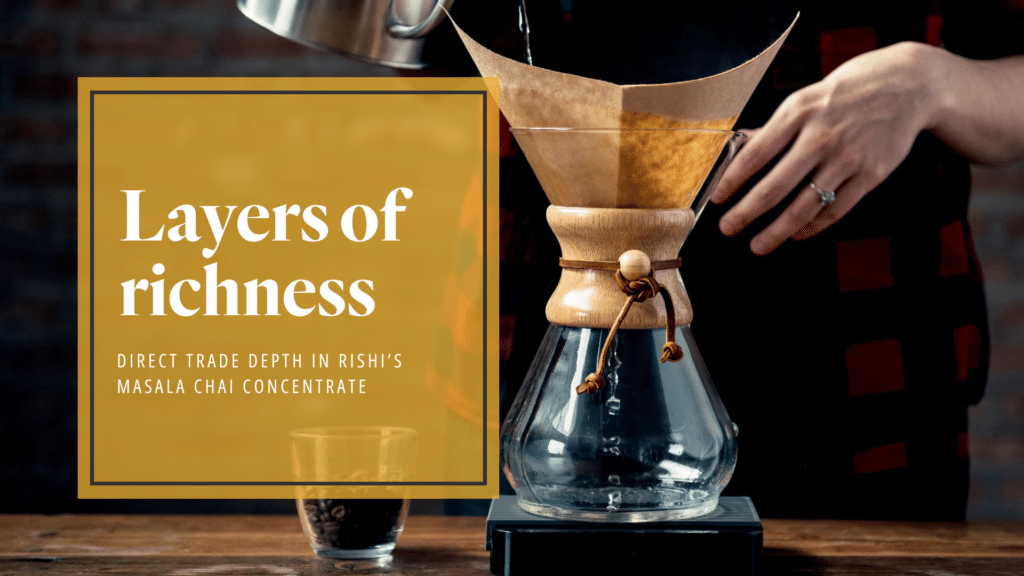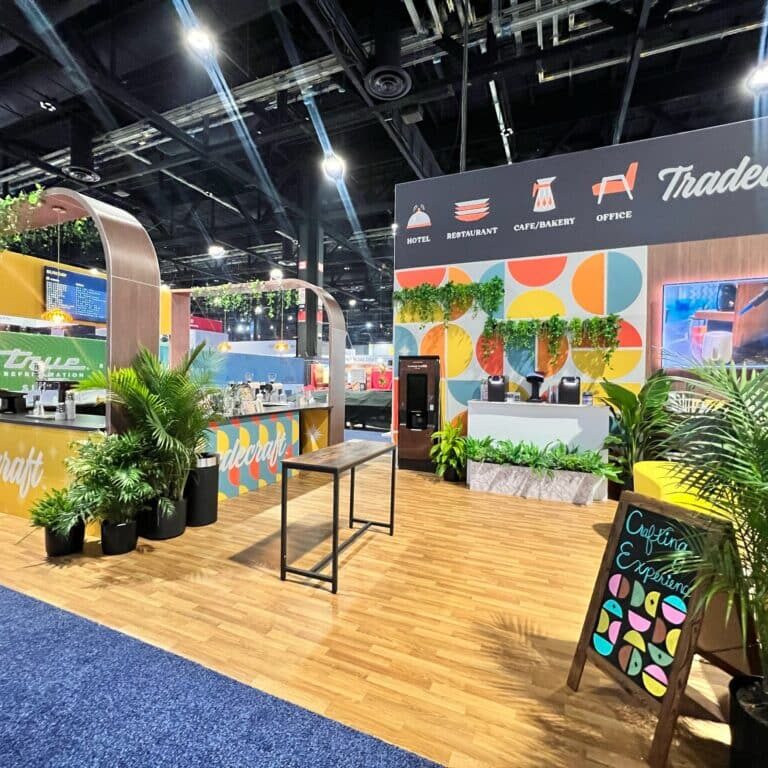
Tea is the global beverage of hospitality and human connection. The ancient history of tea is filled with stories of people coming together and being present in the moment over a cup of tea. Knowing that your tea partner has a focus on enduring, long-term sustainable relationships with farmers and producers makes those tea moments even sweeter to savor.
Through years of travel and firsthand experiences, Rishi Tea & Botanicals has nurtured deep relationships with specialty tea and botanical growers since the company was founded in 1997. The ethos of Direct Trade infuses everything they create—from single-origin loose leaf teas to sachet tea bags, to matcha and iced tea. One of Rishi’s flagship products, served in cafés from coast to coast, is their organic Masala Chai Tea Concentrate, which is layered with incredible Direct Trade ingredient sourcing stories. If you’ve ever tasted Rishi’s Masala Chai concentrate you know it’s different. It’s a rich, slow brewed masterpiece with spice to spare. Each ingredient is specially selected for its aromatic complexity and depth of flavor.
Bold Green Cardamom Pods – Cobán, Guatemala
In the mountainous region of Cobán, Guatemala, there is a small community called Nimlahakok. Rishi works with a group of farmers there to source their incredibly fragrant cardamom, known for its heady and alluring aroma. They began sourcing cardamom from Nimlahakok over ten years ago. The annual cardamom crop is harvested over the course of just 1-2 months, when the pods are gathered from the mountain jungle in late summer and autumn. It is an intensely laborious effort. A day’s harvest of cardamom pods might amount to 80-120 pounds. For these reasons, cardamom is one of most expensive spices featured in Rishi’s Masala Chai blend. While other brands might skimp on cardamom, Rishi celebrates cardamom as a focal aromatic note. It’s part of what makes Rishi’s chai so well balanced, lively and long-lasting on the palate.
Cassia Bark – Yen Bai, Vietnam
Rishi sources their famously sweet and spicy cassia bark from the mountainous Yen Bai region of Northern Vietnam. Cassia is a variety of cinnamon that is grown primarily in Southeast Asia and is noted for having a strong intensity of flavor and a rich concentration of volatile aromatic essential oils. It is distinct from the more subtle Cinnamomum verum (“true cinnamon”) that is grown in Sri Lanka. Rishi selects cassia for its Masala Chai because it provides a deep body of sweetness that lifts up the other fragrant botanicals such as ginger, cardamom and cloves. Rishi’s cassia is proudly grown and produced by the Red Dao ethnic minority group, who are famous for their highland tea and spice farming in Yen Bai. In addition to cassia, Rishi sources some of their high end Garden Direct seasonal tea micro-lots from these producers.
Ancient Heirloom Black Tea – Shan Valley, Myanmar
Rishi also has a deep and unique relationship with the growers of the black tea that provides the base of their Masala Chai. It originates from a special part of the Shan Valley in Burma, an ancient heritage growing region of large leaf Assamica tea varietals. French and British botanist explorers sought out the tea seeds from this area, making the Shan tea famous across all of Southeast Asia. The roots of history run deep in the Shan Valley; the indigenous Pa Laung ethnic people of this area are related to the Pu people of Yunnan, who in 250 BC were among the first to take tea seeds from the wild and plant them in agricultural gardens. The black tea grown from these heirloom tea gardens is distinguished by its depth of aroma and flavor, creating the perfect bold and malty base for Rishi’s Masala Chai.
Rishi practices Direct Trade because it provides them with a bespoke quality and taste profile that makes their products stand out, and because more of the crop value is retained by the artisan growers and producers, rather than brokers or spot traders. Organic tea farming requires long-term planning, preparation, and a commitment to the extra hard work of making vibrant and beautiful teas using only traditional, natural methods. There are no shortcuts. And so organic tea and botanical farmers need to have deep trust with buyers like Rishi Tea. Rishi issues annual crop forecasts at the beginning of each harvest cycle. The forecasts may be related to the next 12-18 months of sales, so they need to have a very clear idea of where their business is going so that they can follow through on their commitments to their farming partners. That is why Rishi’s relationships with their customers are as important as their relationships with producers.
So the next time you’re enjoying a Masala Chai latte, savoring the warmth and balance of the different spices, take a moment to reflect on the amazing global network of like-minded artisans it took to bring it all together, sustainably and fairly for all stakeholders.
To learn more about Rishi Tea & Botanicals, visit their site.
Interested in adding Rishi to your program? Get in touch with the Tradecraft team!

